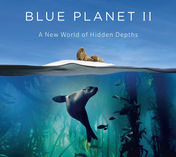God and Blue Planet II
- Chris Manktelow
- Dec 7, 2017
- 3 min read

I’ve recently been immersed in the latest series of Blue Planet and it has got me thinking about what we should say as Christians about the earth’s oceans. Often Christians forget about the oceans when we talk about looking after God’s creation. This is unfortunate, as a healthy ocean is essential to a healthy planet. They dominate our world, covering 71% of its surface. They provide us with abundant resources and regulate our climate. They even enable us to breathe, since ocean plants produce over half of the oxygen within the atmosphere. So, oceans are important and Christians need to take them seriously.
It may surprise you to know that the Bible actually says more than you might think about the oceans. One of my favourite psalms is Psalm 104, which is about the closest the Bible ever gets to a David Attenborough documentary! Part of it talks about the ocean, so I thought that I might offer a few reflections that might help us rethink our attitude towards this blue planet:
‘How many are your works, LORD!
In wisdom you made them all;
The earth is full of your creatures.
There is the sea, vast and spacious,
Teeming with creatures beyond number
Living things both large and small
There the ships go to and fro,
And Leviathan, which you formed to frolic there.
All creatures look to you to give them their food at the proper time
When you give it to them, they gather it up
When you open their hand, they are satisfied with good things
When you hide your face, they are terrified.
When you take away their breath, they die and return to the dust.
When you send your spirit, they are created, and you renew the face of the ground.’
Psalm 104: 24-30, NIV
1. Oceans are there to be enjoyed
I love how excited the psalmist gets about the ‘vast and spacious sea, teeming with creatures beyond number.’ They are clearly thrilled with the diversity of marine life and with the God they see behind it. Often, I think people end up damaging the oceans simply because they don’t spend enough time enjoying the natural world. So, when the weather gets better, get the train down to Exmouth and go to the beach. Walk along the coast path or go scuba diving if that is something you like doing. Being in God’s creation will help you appreciate it and it is much harder to damage something when you truly value it.
2. Oceans are there for their own sake
Sometimes we think that the ocean has no worth beyond what it is worth to us. This belief is not very helpful when you are trying to look after the earth’s oceans. Why bother treating the oceans with respect if they are only useful for providing the cod in your fish and chips?! Fortunately, the psalmist models a much better attitude towards God’s creation. They recognise that each creature has its own special place within God’s plans and purposes. That even includes a huge sea creature, the Leviathan, who is apparently very happy frolicking in its natural habitat. The oceans therefore reflect something of the glory and beauty of the God who sustains them.
3. Oceans belong to God, not us
Throughout Psalm 104, the psalmists make it clear that creation revolves around its Creator and not around creatures like me and you. God breathes life into creatures and takes it away again, the psalmist says. God graciously provides food and all the ocean creatures gather it up and are satisfied. So as Christians, we need to both humbly remind ourselves and rejoice in the truth that the oceans do not ultimately belong to us but to Christ alone. ‘For in Christ, all things were created: things in heaven and on earth, whether thrones or powers or rulers or authorities; all things have been created through him and for him (Col 1:16, NIV).’ Amen!


















Comments